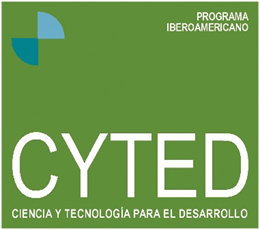Projects
Red 323RT0142- Red Iberoamericana de Innovación para la Sostenibilidad de la Cadena de Valor de Alimentos (ibero-circular)- cyted

Coordinador de La Red: Maria Cecilia Puppo, Centro de Investigación y Desarrollo en Criotecnología de Alimentos (CIDCA, CONICET), Argentina
Coordinator of Portuguese Group: Luis Monteiro Rodrigues
CBIOS Team Members
Ana Sofia Fernandes, António Raposo, Catarina Rosado, Maria do Céu Costa, Maria João Cebola,Maria Lidia Palma,Marisa Nicolai, Patricia Rijo, Paula Pereira, Sergio Faloni
From 2023 to 2026
Description
Red 323RT0142 aims to contribute to economic recovery through scientific-technological cooperation mechanisms associated with the Plant Food Value Chain, focused on fruit and vegetable crops, that provide transferable results. We will work around 5 strategic axes: a-R+D+i; b-Transfer to the productive sector; c-Social Aspects; d-Definition and quantification of indicators, goals and achievements; e-Exploitation, Dissemination and Communication.
Justification: Ibero-America has been one of the regions most affected socially and economically by the pandemic. The Circular Economy is key to designing recovery plans based on the exploitation of our own natural resources. Ibero-America is a region with great diversity of fruit and vegetable crops and its waste (16% of total food waste) offers unique and underexploited opportunities for the recovery of bioactive compounds and use in various co-products.
Ibero-circular is an intersectoral and interdisciplinary consortium with know-how and complementary capabilities that will provide innovative solutions in their added value. A comprehensive approach is proposed that contemplates the recovery/characterization of valuable compounds through green methods, their valorization for the development of sustainable processes and products with high added value for the food, nutraceutical and/or cosmetic sector, together with the reduction of environmental impact. Gender balance and the inclusion of regional communities in the proposed activities are highlighted.
Other participating countries
20 Groups, with a total of 131 Researchers from 8 Ibero-American countries
Funding entity

